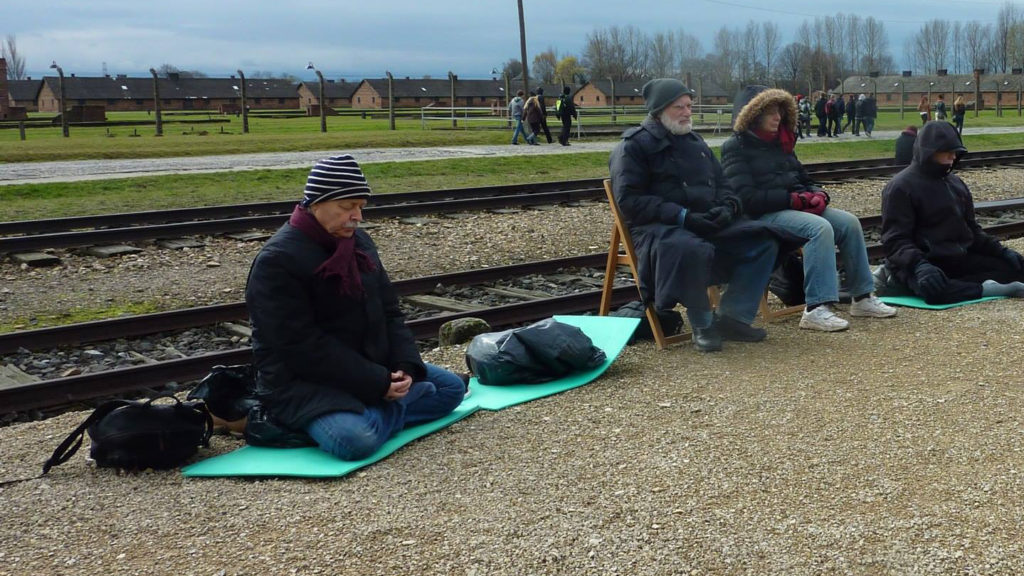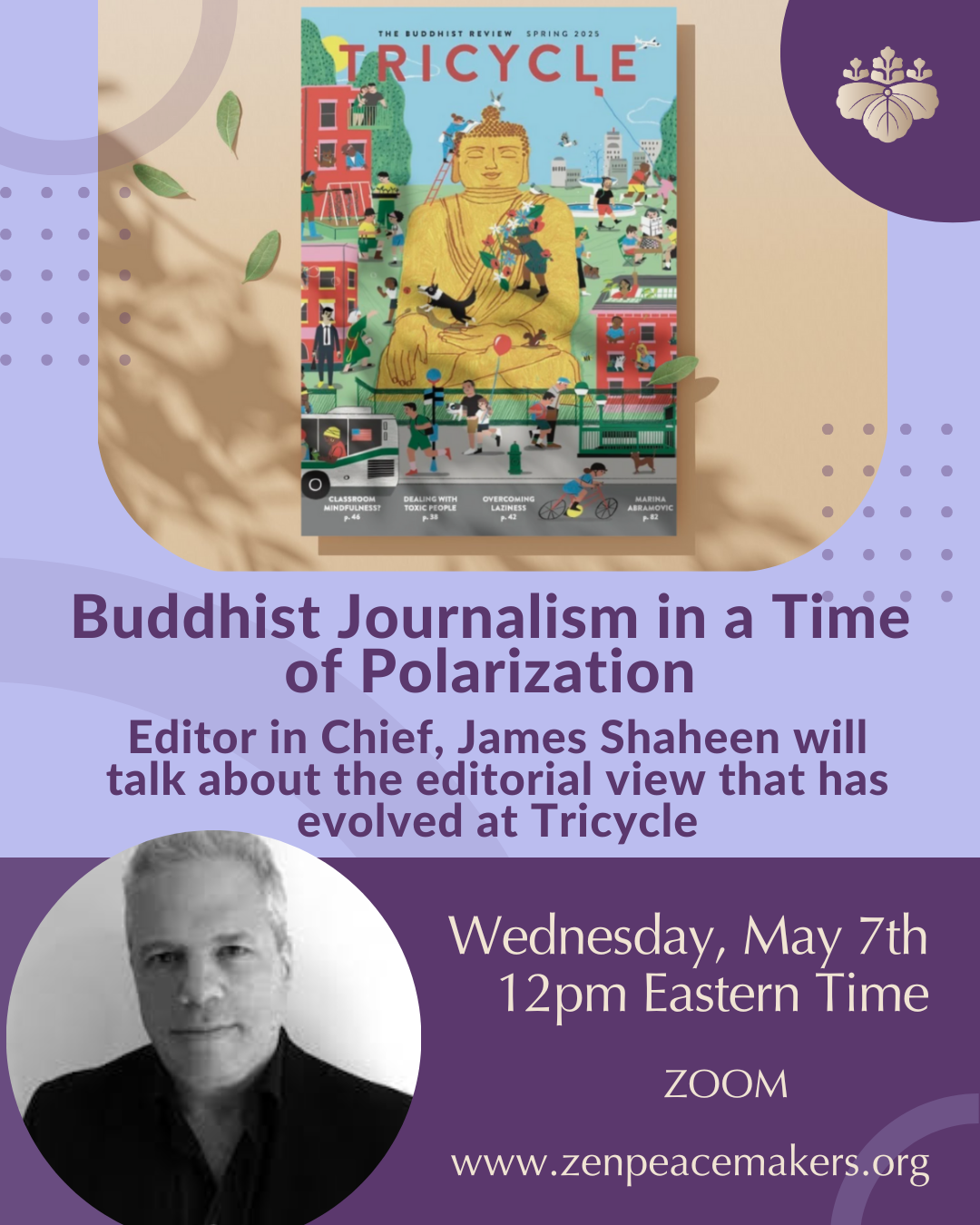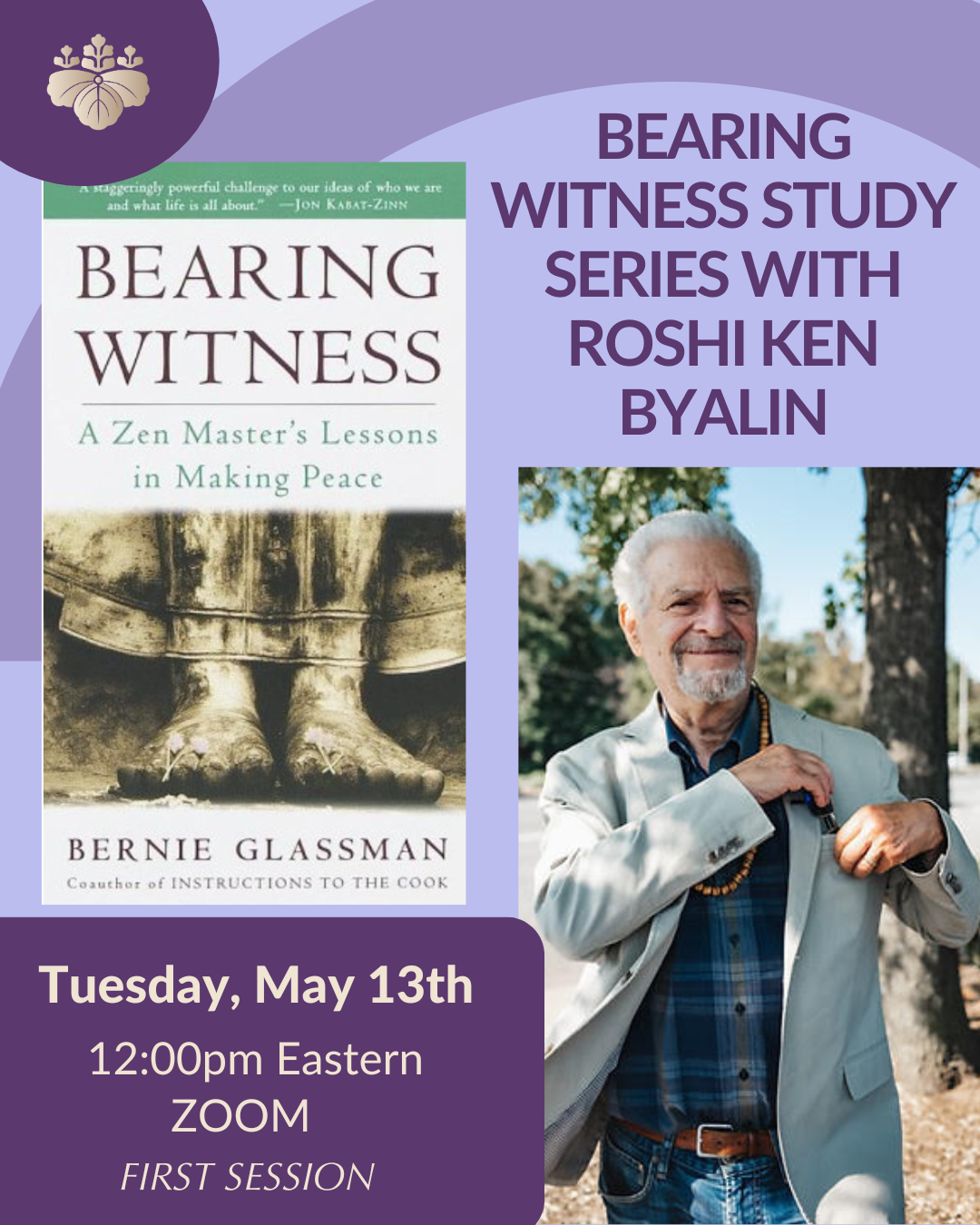Roland meditating on the railroad tracks with Bernie Glassman and Eve Marko during Auschwitz Bearing Witness Retreat 2013. Photo taken by Roshi Andrzej Krawjewski.
This post is another in the series “Flowers on the Edges of Graves” –
reflections from over two decades of participants in the Zen Peacemakers
Auschwitz-Birkenau Bearing Witness Retreats since 1996.
(English followed by German)
Flowers on the Edges of Graves: Roland
By Sensei Roland Yakushi Wegmüller
Translation from German by Annette Wynne
OSWIECIM, POLAND. Often I see participants two days before the retreat in a hotel in Krakow. Patients are referred to me by someone from the staff. A female patient tells me of a long journey by plane, she tells me of sleeping issues and problems with her digestive system, she tells me of a headache and beginning cold. My job as a doctor is to deeply listen; to perceive the person’s energy that I’m with, on a nonverbal level. This is not only my approach to healing as a doctor on the retreat, but my approach to healing everywhere. The encounter itself provides the potential for healing when the space is open and I am ready to just be there, to simply be there for this person. Before the retreat, I often notice that the patients are tense, anything but relaxed. According to their history and their family’s involvement in this history, it costs them great courage to overcome the obstacles that try to prevent them from embarking on this journey, and to feel the feelings and emotions of the retreat in Auschwitz. After 14 years of practicing in Auschwitz with the Zen Peacemakers, I have developed deep trust in the manner of how this retreat is designed, the spirit holders, the staff, and our spiritual guidance of the three tenets which form the basis of the evolving process.
The Three Tenets of the Zen Peacemakers are:
Not-Knowing by giving up fixed ideas about ourselves and the universe.
Bearing Witness to the joy and the suffering of the world.
Taking Action that arises from Not-Knowing and Bearing Witness.
My trust comes out of these three tenets, which I bring into the relationships and encounters I have with the patients. People who come to the retreat experience fear that causes tension, but the fact that they have registered and are now actually taking part in the retreat is also proof of great energy. They want to become familiar with their family history, as well as the collective history. They want to open up to these histories, or else they would not be here. To open up, for me, means to be alive, to be in movement, to be moving on. And in everything that moves, there is the potential for healing.
In my own personal path, my own process of moving on, the three tenets are my most important spiritual guidance. Whether my own adult children ask me for advice or I’m trying to find a feasible way to work with my patients, they are my guidance, my impulse, my approach. First thing that I do is open myself up to the wide open space of Not-Knowing. Then I look and listen to the situation as it appears in this moment and a process starts, the next step organically reveals itself. The whole process relies on presence. The presence of a human being who is there for another human being is often enough to get the process of self-healing started. Homeopathic globuli, a painkiller remedy, a pill for sore throat, or an antibiotic support the healing. Often I tell my patients that being sick is also healthy. It is part of our lives, just as all of our emotions and different ways of expressing ourselves are part of our lives too.
During one of the retreats, there was a Jewish American woman who was shocked when she realized not only that I, as the retreat doctor from Switzerland, was German speaking, but that there were other German speaking doctors on the same retreat. She described a horrible image from the history of Auschwitz that had been accompanying her since childhood, one which showed the German doctors waving their hands in one or the other direction to display the way human beings had to go either to the gas chamber or to the work camp. And now there were German speaking doctors here! At the end of the retreat, the woman expressed that she felt so much lighter after many years of depression, and that she was very grateful for her participation in the retreat and for the many encounters which had been very positive for her.
Whether in my practice here in Bern as a general practitioner or as the Auschwitz retreat doctor, the most important thing for me is to be here for the people who are looking for help from me; to be here for them, to be with them, and to find out together what can support them during their very personal and individual healing processes. My annual participation in the Auschwitz retreat is a powerful practice for me. It is an honor for me to be of service to the retreat and its participants, as part of this wonderful Zen Peacemaker Family.
Sensei Roland Yakushi Wegmüller is a dharma successor of Bernie Glassman. From 1982 to 1985, he lived in West Africa and received initiations as a shaman. Between the years of 1990 and 2000, he pursued meditation and dream-work in the Sufi Lineage of Irina Tweedie. Since 1999, he has studied Zen with Roshis Bernie Glassman, Eve Marko and Genro Gauntt. Roshi Eve Marko gave him transmission as a Lay Preceptor of the Zen Peacemakers and Roshi Bernie recognized him in July, 2017 as a Roshi in his lineage. Since 2003, he has been the President of the Peacemaker Gemeinschaft Schweiz. He and his wife Barbara Salaam lead the Spiegel Sangha in Berne and support the immigrant and refugee community there. In addition to the Auschwitz retreat, they have both participated in many Bearing Witness retreats, including in Rwanda (2014), Black Hills (2015) and Bosnia-Herzegovina (2017).
Join Roland and the Zen Peacemakers in Auschwitz in November 2017
Seit 14 Jahren als Arzt im Zen Peacemaker Retreat in Auschwitz
—
Sensei Roland Yakushi Wegmüller
OSWIECIM, POLEN. Oft sehe ich Teilnehmende schon zwei Tage vor dem Retreat im Hotel in Krakau. Sie werden mir jeweils durch jemandem aus dem Staff zugewiesen. Die Patientin erzählt mir dann von einer langen Flugreise, von Schlafstörungen und Verdauungsproblemen, von Kopfschmerzen und einer beginnenden Erkältung. Meine Aufgabe als Arzt ist es tief zuzuhören und mein Gegenüber auch nonverbal in seiner Energie wahrzunehmen. Dies ist nicht nur als Retreat Arzt mein Ansatz, sondern generell. In der Begegnung selbst ist das Potential zur Heilung, wenn der Raum offen ist und ich bereit bin einfach nur da zu sein, für diesen Menschen. Vor dem Retreat nehme ich in den Patienten oft eine gespannte Energie wahr. Je nach der Geschichte und der familiären Betroffenheit darin, braucht es Mut und Überwindung die Reise anzutreten und sich einzulassen auf das Retreat in Auschwitz. Nach vierzehn Jahren Praktizieren in Auschwitz mit den Zen Peacemakers, habe ich tiefes Vertrauen in die Art und Weise, wie das Retreat geführt wird, in die Spiritholder und den Staff und in unsere Ausrichtung der drei Grundsätze, die Grundlage des Prozesses sind.
Die drei Grundsätze sind:
- Nicht Wissen, das loslassen von fixen Ideen über uns selbst und das Universum.
- Zeugnis ablegen über Freude und Leid in der Welt.
- Handeln aus Nicht Wissen und Zeugnis ablegen.
Dieses Vertrauen bringe ich mit in die Begegnung mit dem Patienten. Menschen die zum Retreat kommen, haben Gefühle von Angst die Spannung auslöst, aber die Tatsache, dass sie sich angemeldet haben und nun teilnehmen, zeugt auch von grosser Energie . Sie wollen vertraut werden mit ihrer Familiengechichte oder der kollektiven Geschichte. Sie wollen sich einlassen, sonst wären sie nicht da. Sich einlassen heisst für mich lebendig sein, in Bewegung sein. Und in allem was sich bewegt liegt auch das Potential für Heilung.
Für meinen eigenen Weg sind die drei Grundsätze mein wichtigster Wegweiser. Ob meine erwachsenen Kinder mich um Rat fragen, oder ob ich gemeinsam mit Patienten einen gangbaren Weg suche, sind sie mein Ansatz. Zuerst öffne ich mich dem weiten Raum des Nicht Wissens, dann sehe und höre ich der Situation zu, in diesem Moment und daraus entsteht der nächste Schritt. Der ganze Prozess beruht auf Präsenz.
Die Präsenz eines Menschen, der für den anderen da ist, reicht oft schon, um Prozesse der Selbstheilung in Bewegung zu setzen. Homöopathische Kügelchen, eine Schmerztablette, eine Halswehtablette oder auch ein Antibiotika unterstützen die Heilung. Oft sage ich meinen Patienten auch, dass Kranksein auch gesund ist. Es gehört zu unserem Leben wie alle unsere Gefühle und unsere verschiedenen Ausdrucksweisen.
In einem der Retreats war eine jüdische Amerikanerin, die schockiert feststellte, dass nicht nur ich als Retreat Arzt aus der Schweiz, deutschsprachig war, sondern dass es noch andere deutsche Ärzte am Retreat hatte. Sie drückte aus, dass die Geschichte von Auschwitz mit deutschen Ärzten, die Menschen mit Handzeichen in Richtung Gaskammern oder ins Arbeitslager sandten, ein Horrorbild sei, dass sie seit Kindheit begleite. Und nun waren hier deutschsprachige Ärzte! Am Ende des Retreats sagte die Frau, sie fühle sich so viel leichter, nach jahrelanger Depression, und sehr dankbar für die Teilnahme am Retreat, für die vielen Begegnungen, die äusserst positiv für sie waren.
Ob in meiner Praxis als Hausarzt, hier in Bern oder als Retreat Arzt ist das Wichtigste für mich, für den Menschen der Hilfe von mir erwartet, da zu sein und mit ihm zusammen heraus zu finden, was ihn unterstützt in seinem ureigenen Heilungsprozess.
Meine jährliche Teilnahme am Auschwitz Retreat ist für mich eine gute Praxis und es ist eine Ehre für mich, dem Retreat und seinen Teilnehmenden damit zu dienen als Teil dieser wunderbaren Zen Peacemaker Familie.
Sensei Roland Yakushi Wegmüller arbeitet seit 1988 als Allgemeinpraktiker und Homoeopath in seiner eigenen Praxis. Als Leiter eines Impfprogrammes arbeitete er von 1982 bis 1985 in West-Afrika und kam in Kontakt mit afrikanischen Ritualen. Von 1991 bis 2000 praktizierte er unter der Anleitung von Annette Kaiser den Sufi Weg in der Linie von Irina Tweedie. Seit 1999 ist er Schüler des Zen Meister Roshi Bernie Glassman, der ihn zum Dharma Halter der Zen Peacemaker Kreise ernannte. Er ist Gründungsmitglied der Zen Peacemaker Kreise in Europa und der Schweiz und ist Steward des Heilerkreises Bern. Als Initiant des “Klub der 200” ist er Spendensammler für das Palästinensische Center Holy Land Trust, das sich für die friedvolle Lösung des Palästinakonfliktes einsetzt. 2008 erhielt er von Sensei Eve Marko Transmission zum Preceptor mit der Lehrerlaubnis, Menschen auf dem Weg zu Jukai zu begleiten und Jukai zu geben. Er leitet Zen Meditation und Schweige-Retreats. Am 24. April 2011 erhielt er von Roshi Bernie Glassman die Bestätigung als Sensei.






Eén reactie
Great article, dear Roland, it really speaks to me in a way that I am recognizing you, the place with its challenges, myself and my five Auschwitz-retreat-journeys as well as the open space in between.
It has been comforting me, always, to know that you have been with us, in The Black Hills and recently, in Bosnia-Herzegowina, when I asked for your presence and medical feed-back, so to speak. But then it was not a medical feed-back, but a human, a personal feed-back, that was needed and deeply appreciated. From that moment I was freed from anxiety concerning my body. But the mind was also freed.
Your simple words have described almost exactly what I have been always experiencing, as non-doctor, but as a healer, a wounded healer, a German grandmother and zen-practitioner. The three tenets are my corner-stones, and in the moment I think I know something, I only know one thing: I will not meet life as it is.
Thank you for your deep dedication and persistance.
I am treasuring nourishing memories from precept studies, much fun and some sewing assistance with my first Rakusu in Spiegel, Bern, in 2011,
Lots of blessings,
Monika Jion